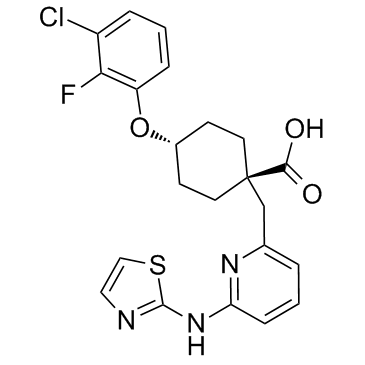1010085-13-8
| Name | 4-(3-chloro-2-fluorophenoxy)-1-[[6-(1,3-thiazol-2-ylamino)pyridin-2-yl]methyl]cyclohexane-1-carboxylic acid |
|---|---|
| Synonyms |
VX-689
Cyclohexanecarboxylic acid, 4-(3-chloro-2-fluorophenoxy)-1-[[6-(2-thiazolylamino)-2-pyridinyl]methyl]-, trans- MK-5108 (VX-689) cc-619 MK-5108 trans-4-(3-Chloro-2-fluorophenoxy)-1-{[6-(1,3-thiazol-2-ylamino)-2-pyridinyl]methyl}cyclohexanecarboxylic acid |
| Description | MK-5108 is a highly potent and specific inhibitor of Aurora-A kinase with an IC50 value of 0.064 nM. |
|---|---|
| Related Catalog | |
| Target |
Aurora A:64 pM (IC50) |
| In Vitro | MK-5108 inhibits Aurora-A activity with an IC50 value of 0.064 nM in an ATP-competitive manner. It shows robust selectivity against the other family kinases Aurora-B (220-fold) and Aurora-C (190-fold). MK-5108 also exhibits high selectivity for Aurora-A over other protein kinases. MK-5108 inhibits the growth of 14 cell lines with IC50 values between 0.16 and 6.4 μM[1]. |
| In Vivo | MK-5108 treatments at 15 and 30 mg/kg results in significant tumor growth inhibition in the HCT116 tumor model. MK-5108 is well tolerated at both doses, with minimal reduction in body weight. MK-5108 also exhibits significant antitumor activity in nude rats bearing SW48 tumors. MK-5108 at 15 and 45 mg/kg causes dose-dependent tumor growth inhibition with a %T/C of 35% and 7% at day 10, and 58% and 32% at day 27, respectively. MK-5108 is well tolerated in nude rats, with no body weight reduction and moderate effect on blood cells[1]. |
| Kinase Assay | The Aurora-A assay reaction is conducted in the presence of 20 μM ATP, 25 μM Tetra-Kemptide, 1.0 μCi per well [γ-33P]-ATP, 0.1 ng per well Aurora-A in 50 mmol/L Tris-HCl (pH 7.4), 15 mmol/L Mg(OAc)2, and 0.2 mmol/L EDTA at 30°C for 40 min. To investigate the inhibition mode of MK-5108 for Aurora-A, the IC50 values of MK-5108 are determined in the presence of different concentrations of ATP. Then, the IC50 value is plotted as a function of ATP concentration to analyze the effect of ATP concentration on the IC50 value of MK-5108[1]. |
| Cell Assay | Cells are seeded in 96-well plates then incubated overnight. A medium containing MK-5108, docetaxel, or DMSO control is added and is incubated for 72 h. The cell population densities are then measured by the WST-8 colorimetric assay using a SpectraMax Plus384 plate reader. Concentration response curves are generated to give the decrease in cell population density in MK-5108– and docetaxel-treated samples relative to DMSO-treated control. Growth inhibition IC50 values are determined from those curves[1]. |
| Animal Admin | Rats: After 8 d, MK-5108 is suspended in 0.5% methyl cellulose/0.24% SDS and orally administered twice daily for 14 d. SW48 cells are suspended in 50% Matrigel/50% PBS and s.c. transplanted into the side flank of nude rats. After 7 d, MK-5108 is suspended in 0.5% methyl cellulose/0.24% SDS and orally administered twice daily for 2 d/wk for 3 wk. In a HeLa-luc and ES-2 dual flank xenograft model, HeLa-luc or ES-2 cells are suspended in 50% Matrigel and 50% PBS, and s.c. transplanted into the right or left side flank of nude rats. After 8 d, vehicle (5% ethanol-saline) or 7.5 mg/kg docetaxel is injected i.v. MK-5108 is orally administered twice daily for 2 d 24 h after the docetaxel injection. The volume of each tumor is determined from the tumor diameter[1]. |
| References |
| Density | 1.4±0.1 g/cm3 |
|---|---|
| Boiling Point | 637.6±65.0 °C at 760 mmHg |
| Molecular Formula | C22H21ClFN3O3S |
| Molecular Weight | 461.937 |
| Flash Point | 339.4±34.3 °C |
| Exact Mass | 461.097626 |
| PSA | 112.58000 |
| LogP | 4.58 |
| Vapour Pressure | 0.0±2.0 mmHg at 25°C |
| Index of Refraction | 1.651 |
| Storage condition | -20℃ |
